This spring theme printable game is a fun way to add a little extra counting practice into your preschool math lesson plans. Featuring ducks at a pond, this game can also be added to a Pond Preschool Theme or Baby Animals Preschool Theme.
Teach Cooperation with Spring Theme Printable Game
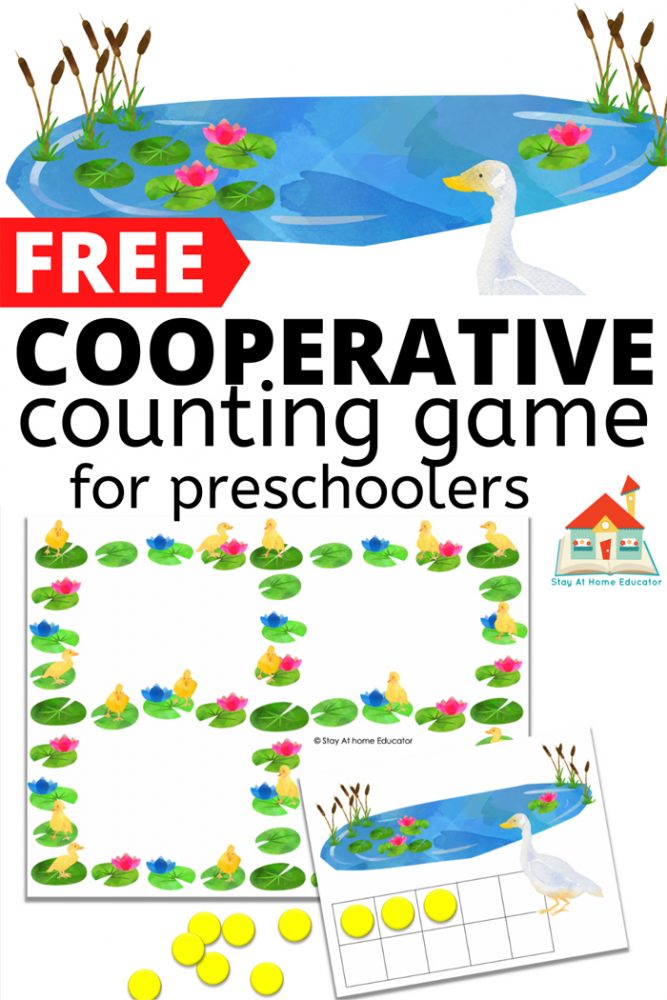
I am writing this at the beginning of what is now being termed as “Coronapocalypse.”
Grocery stores are like ghost towns. Their shelves are empty except for the few misplaced items that have been discarded in a rush and thrown back on the wrong shelf.
Entire cities have gone into 24-7 lockdown.
Schools have canceled for the foreseeable future, involuntarily thrusting millions of parents into homeschooling.
These are uncharted territories for many of us!
Suddenly being home from school can be difficult for kids, and definitely for parents. I think it is safe to say that everybody’s routine is a bit out of wack as we all work to create new routines and structure at home.
One thing I’ve noticed is my kids fighting more. Initially, I thought it was because our school district had sent an iPad Pro home with every student. We went from a household of two iPads and one MacBook Pro to a household of 1:1 devices, not including my husband’s and my phones.
At first, it was a relief having the extra technology in our home. Knowing only the best educational apps were available on my kids’ school iPads, I didn’t feel so bad about extending their screen time while I doubled the workload on my blog and responded to the needs of my readers. There was less fighting about how much time they all got, about who had more or less time, about who got to play what games.
It was nice.
And then my kids started begging for even more time. They became very clever in their excuses to convince me to allow them to have even more time.
And then the fighting started again, but this time it transferred over to other things, like cleaning out the dishwasher, putting away their balance bikes and scooters, and who got their snacks first.
So, this spring theme game for preschoolers came out of necessity at my own house. It’s a cooperative game, which means that all players work together as a team to win the game. I’ve shared some other cooperative games below.
While my oldest kids are too old to enjoy it, but my youngest three have plenty to learn. (That said, my oldest kids could learn from it too. Ha, ha!)
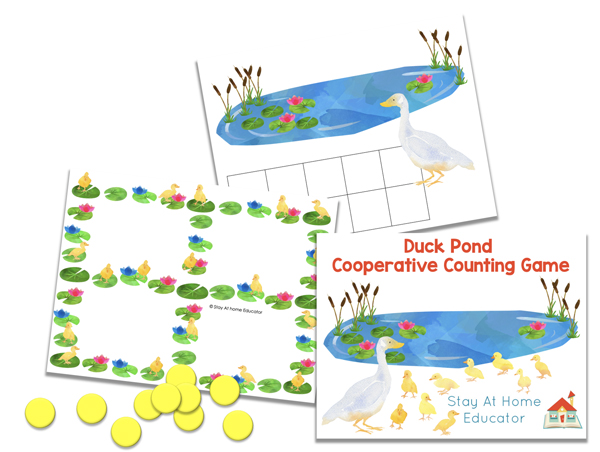
FAQ About The Benefits of Games for Preschoolers
Playing games with your preschooler is more than just a special bonding time. Playing games has huge benefits! Here are some benefits of playing games with your young learners. They can:
~ offer multiple opportunities for learning.
~ get kids to think critically.
~ encourage oral language development.
~ help your child focus and lengthen their attention span.
~ teach teamwork and inclusiveness.
~ provide a fun way of connecting and bonding.
~ help navigate new friendships.
~ ease social anxiety.
~ teach kids how to be a good loser.
Many young children are a little apprehensive when put in situations that require peer interaction. Games are a fantastic way to ease that anxiety.
“Because they’re structured, board games can provide an easier way to build interpersonal relationships with peers, since the child knows what’s expected of them,” explains Regine Galanti, Ph.D., a licensed clinical psychologist and professor at the Ferkauf Graduate School of Psychology.
Additionally, games can also teach children inclusion, tolerance, cooperation, and resilience when working with others.
Teachers are increasing the use of game and game principals to enhance their instruction. Reason being is that research sites that using games can increase student participation, foster social development, and amplify emotional learning.
Studies have also found that games can improve focus and attention, as well as improve spatial and temporal attention. This can result in higher reading levels.
Games are not a replacement for other forms of learning. They are a tool that can be used in education, but they need to be well-planned and only used when they are relevant to the learning objectives.
Spring Theme Printable Cooperative Counting Game for Preschoolers
Amidst all the turmoil in the world right now, a spring themed printable seemed like just the theme to add a little happiness to our days. Like I said, our family was in need of some cooperative play activities for preschoolers.
This printable can be used to supplement your springtime activities, as well as a baby animal theme, bird theme, or pond theme. (That’s a lot of different uses!)
Materials
You just need some basic supplies for this cooperative game, all of which you probably already have at home or in your classroom.
- free printable game
- yellow counters (math counters, pom poms, mini erasers, buttons, etc)
- dice
- game pieces
I have a stash of game pieces on hand for my Fine Motor Task Boxes, and we like to use them in our playdough recipes, too, but if you don’t have any, you can use just about any small item to be game pieces. Just make sure they all look different.
Best Game Pieces
Object of the Game
It became pretty evident that we needed to spend some time doing things together and working together. That’s what this preschool printable does. All the players work together to win the game. There are no teams. No individual players. Everyone is working toward the exact same goal.
The object of the game is to collect ten ducklings from the game board and return them to their mama duck on the scorecard. Players do this by moving their game pieces onto a space with a duckling, at which point they place a yellow counter on the scorecard to represent that duckling. The game ends when the entire ten frame has been filled with ducklings.
How to Play Duck Pond Cooperative Counting Game
The game is really simple to play, and most of the challenge comes from teaching the players to work together. This can be a big mind-shift for some preschoolers. I recommend walking the players through each step of the first few turns.
- Select a child to roll first. Roll the dice and identify the number.
- Discuss as a group which way to move the game piece. The game piece should be moved so that children can gather a duckling, which is done by landing on a duckling space.
- If the game piece lands on a duckling space, add a pom pom (or other duck manipulative) to the ten frame on the group scorecard. If the player does not land on a duckling space, he does nothing.
- Play moves to the next child and the steps above are repeated.
- The game ends when the ten frame is filled, meaning that ten ducklings have been gathered and returned to the mother duck.
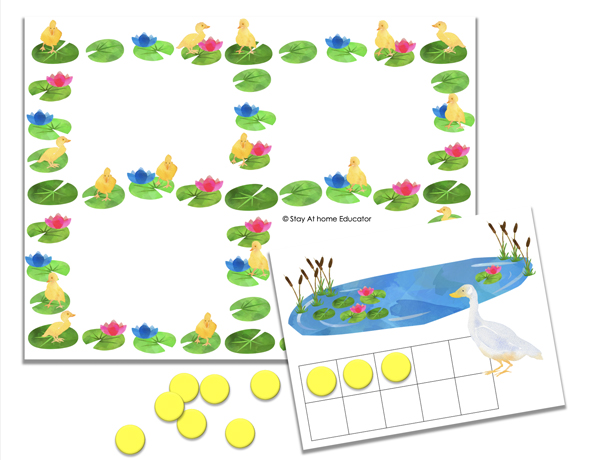
A Few Notes About How to Play
Here are a few other things to know about how to play this game.
- Each player gets their own game piece to move.
- Players can move their game pieces in any direction around the board.
- For more advanced play, players can move any game piece to get to a duckling.
- There are more ducklings on the board than will be collected. To win the game, only ten ducklings need to be collected.
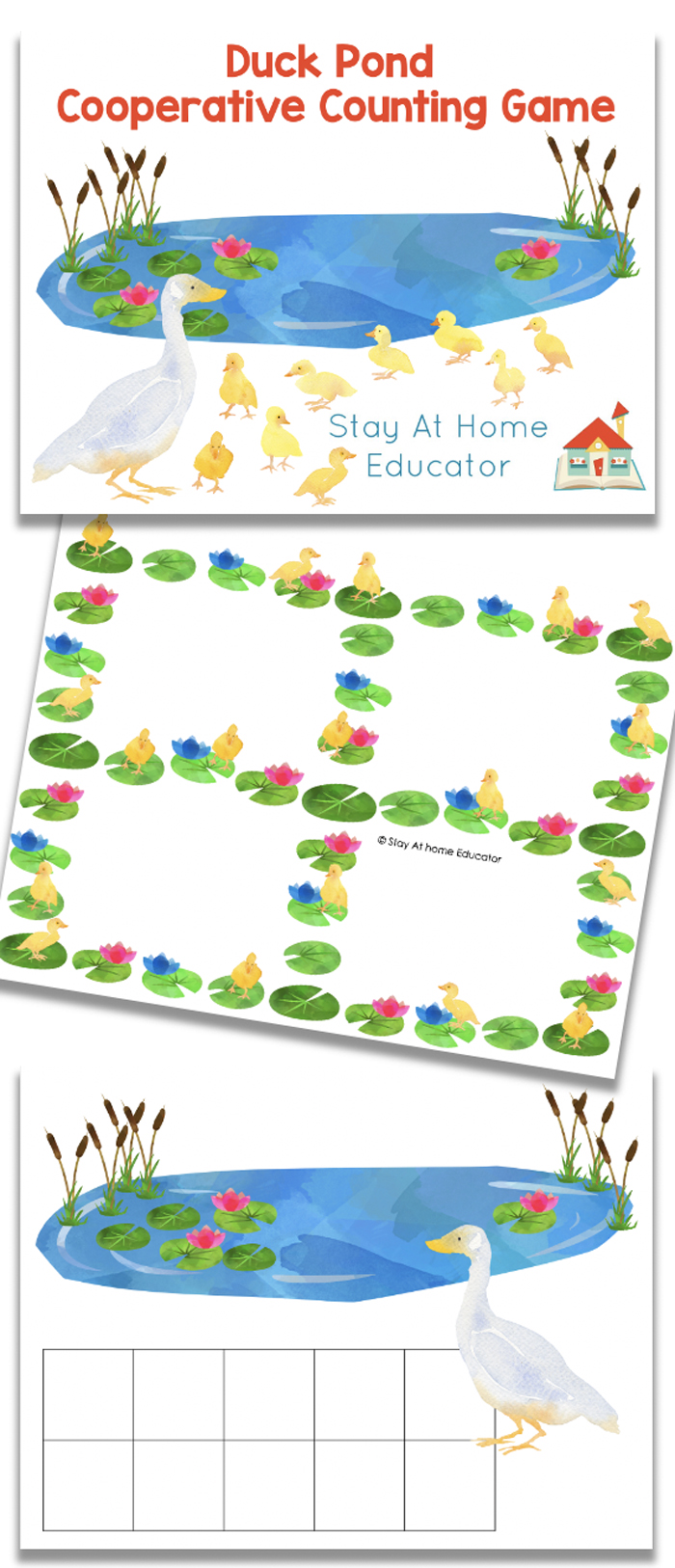
House Rules that Can be Added to The Game
I love any game with a set of house rules. After your preschoolers get used to playing the traditional way, you can add your own house rules. Here are some ideas for consideration.
- Allow players to move any game piece in an effort to get a duckling, rather that moving just their own piece.
- Enforce that players must make a quacking noise any time a duckling is captured and returned to its mother.
- Use a set of 1-6 number flashcards to work more on number identification.
- Print a second set of the scorecard and work to capture 20 ducklings.
What house rules would you add to this game?
Get Your Cooperative Game Here
Think this is something your home or classroom needs right now? You can add it to your math activities or it can be used to work on fine motor skills. This game can even be used in circle time or can be added to a duck theme sensory bin.
Grab your own copy below. Then, keep reading for more free spring theme printables for preschoolers!
More Fun Spring Theme Printables
These are all free printables for spring and awesome learning activities for kids. Just click the images to get your own copies.
Spring Theme Printable Preschool Centers
These spring printables are designed with preschoolers in mind.
-
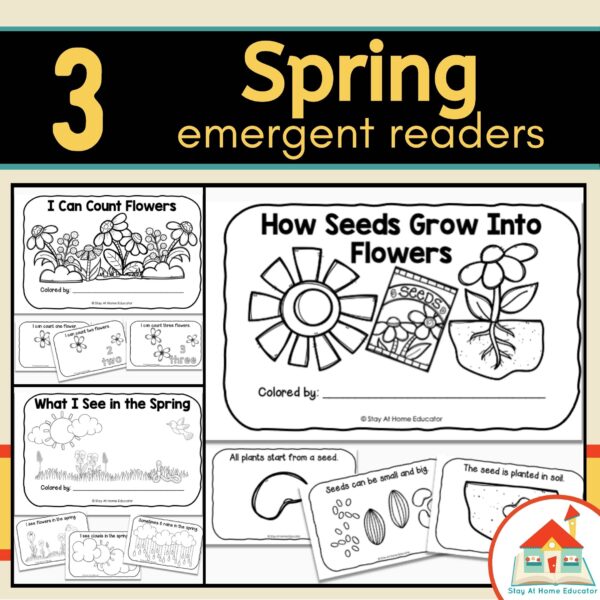 Spring Emergent Readers$3.00
Spring Emergent Readers$3.00 -
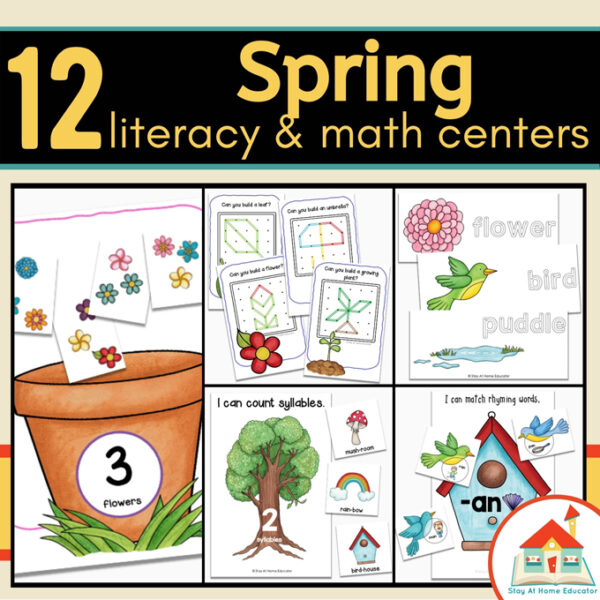 Spring Preschool Centers$9.00
Spring Preschool Centers$9.00 -
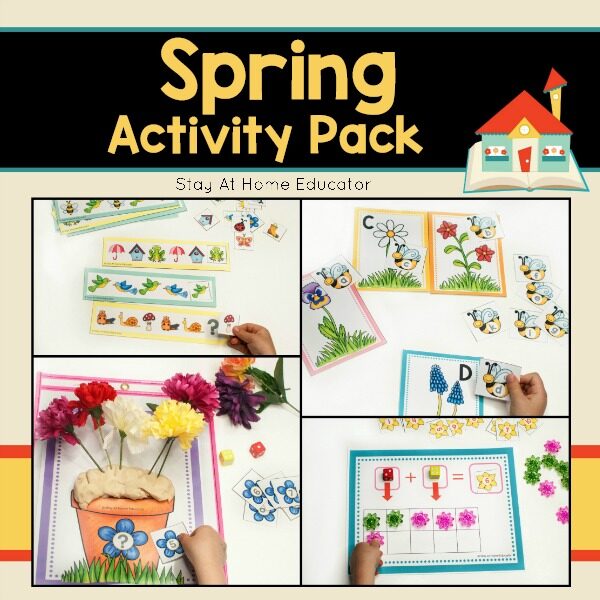 Spring Activity Pack$5.00
Spring Activity Pack$5.00

I’m Sarah, an educator turned stay-at-home-mama of five! I’m the owner and creator of Stay At Home Educator, a website about intentional teaching and purposeful learning in the early childhood years. I’ve taught a range of levels, from preschool to college and a little bit of everything in between. Right now my focus is teaching my children and running a preschool from my home. Credentials include: Bachelors in Art, Masters in Curriculum and Instruction.
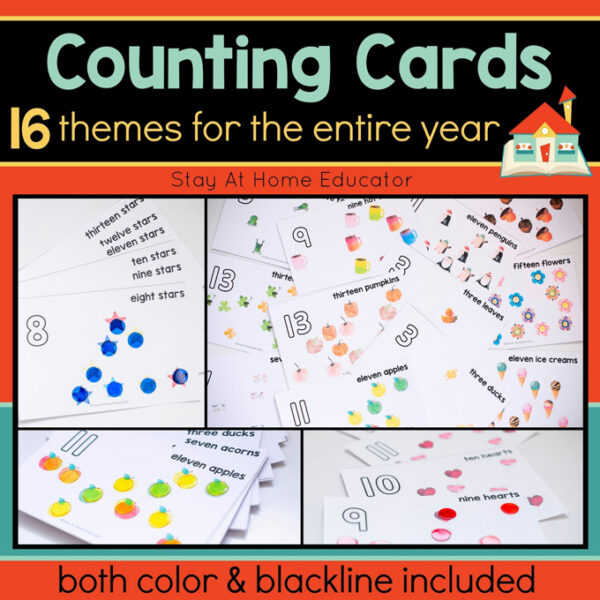
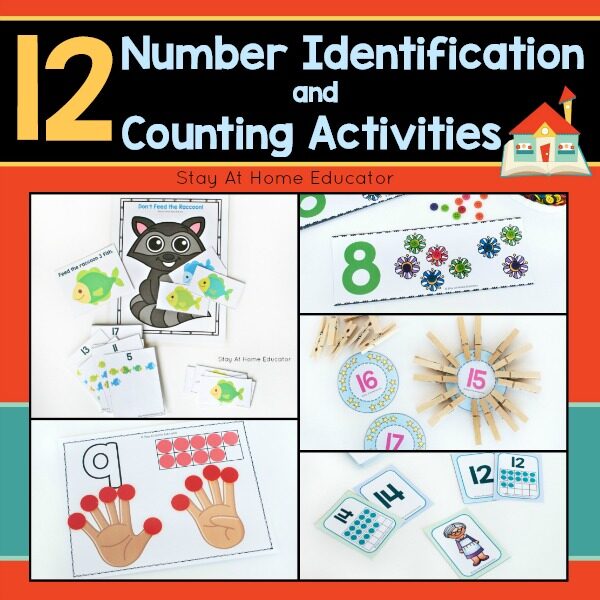
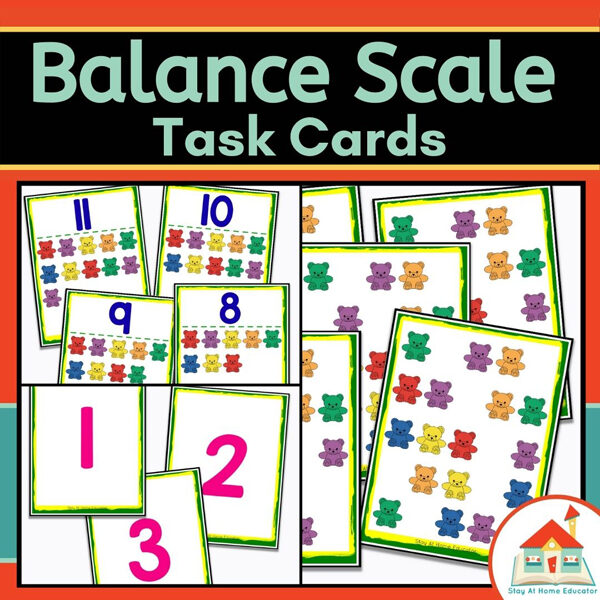

This is great! I like to use ten frame activities with each theme throughout the year; what a creative idea. I know you have your own plans for more already, but if you’re looking for ideas my students love all things unicorn. Thank you for sharing. I’m sure we are all worried about at home activities becoming routine; this will add some variety.